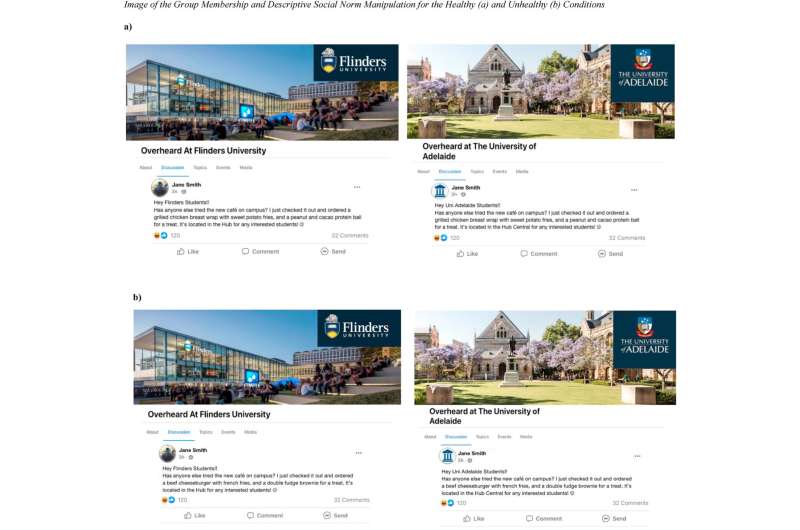Image of the group membership and descriptive social norm manipulation for the healthy (a) and unhealthy (b) conditions. Credit: Appetite (2024). DOI: 10.1016/j.appet.2024.107374
New research from Flinders University has revealed that feeling a sense of belonging to a social group can have a significant impact on our food choices, potentially nudging us towards healthier options.
The study is published in the journal Appetite.
"Social groups, such as one's nationality or university, provide group members with a shared social identity, or a sense of belonging, and can influence their behavior," says Professor Eva Kemps, from the College of Education, Psychology and Social Work.
"Accordingly, when someone sees themselves as belonging to a group, and feels that their membership to the group is an important part of their identity, they are more likely to bring their behavior in line with what is perceived as the 'norm' for that group.
"This has shown to be true in influencing what we eat and the food choices we make, and could have implications for the development of health campaigns and interventions that aim to promote healthier food choices," she says.
Researchers say making healthier food choices is vital, with 65% of Australians aged 15 and over being overweight or obese. Furthermore, 92% of adults do not meet the recommended five-six daily servings of vegetables and 49% do not eat the recommended two servings of fruit.
A diet that is high in unhealthy foods and low in nutrition is a major contributor to the prevalence of diseases such as diabetes, heart disease and cancer, which are the leading causes of death worldwide.
The new study tested the idea that people are more likely to adopt healthy food choices if they feel like they belong to the same group or community as those who are promoting healthy eating habits.
Study recipients were undergraduate students, and their university affiliation was used as the example of their valued group membership, meaning that they were either part of the same university group (in-group) or not (out-group).
Conducted using Facebook groups—a popular platform for university community pages—students either felt an affinity to, or indifference to, a group and were then presented with healthy and less healthy food options and assessed on their choices.
"When people are exposed to social norms on Facebook such as what others eat, they are more likely to be influenced by someone in the same group with them than by someone who isn't. This builds on the age-old adage of the 'herd mentality,'" says Professor Kemps.
"This is because people are more likely to identify with and internalize the behaviors of someone who shares a common group interest or affiliation with them, which can lead to changes in their own behavior.
"We found that when people felt a sense of connection or belonging, they were more likely to be influenced one way or the other.
"This builds on the growing literature that shared group membership can affect someone's behavior, particularly when it is applied to food choices.
"While the results are promising, further research is required to explore our understanding of social influence and its role in shaping people's behavior, especially in the context of food and how we can influence people to make healthier choices," she adds.
"Our study demonstrates that people within a 'group' are more likely to view the behavior of other perceived group members as an appropriate or relevant guide. Therefore, seeing fellow group members make healthy choices—or receiving a healthy food recommendation from them—may promote healthier eating habits," says study lead-author Juliana Gleaves.
"We hope the outcomes of our findings will lead to further research in this area that ultimately generates improved communications and support materials for health campaigns and interventions that promote healthier food choices in social media settings and beyond," she adds.
More information: Juliana Marie Gleaves et al, I'll have what She's having (but not what They're having): The moderating role of group membership in the effect of social norms on food choice in an online environment, Appetite (2024). DOI: 10.1016/j.appet.2024.107374
Journal information: Appetite
Provided by Flinders University























